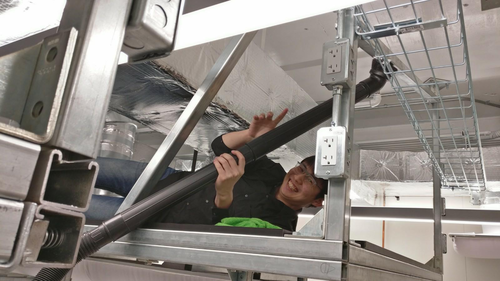The Institute for Quantum Computing’s (IQC) Achievement Award is given to a University of Waterloo graduate student who studies quantum information and has achieved excellence in research. The latest winner, Chung-You Shih of the Department of Physics and Astronomy, talked with us about his PhD research, thinking about working in industry, and his advice for students looking to study quantum information.
Congratulations on your Achievement Award Chung-You. How did you end up studying quantum information science at IQC?
I learned that Rajibul Islam [a faculty member at IQC and in the Department of Physics and Astronomy] was starting a lab at IQC just as I was looking for schools to apply to for my graduate studies. I was studying ultracold atom physics, just like he was doing when he was at Harvard. I knew I wanted to be the first student at his new lab, the Laboratory for Quantum Information with Trapped Ions.
What are you researching for your PhD?
My research is about trapped ion quantum computing. I’m working on a new optical addressing system for trapped ions. In a trapped ion quantum computer, the ions are the qubits in the system—they store the fundamental units of quantum information.
They are levitating in a vacuum chamber. We need to use lasers to program them, but the ions are probably less than one hundredth of a hair apart. It is very difficult to precisely target an individual atom with a laser. So, I’m helping to develop a new type of optical addressing system that uses the technology of holograms to control the light so we can address each ion with extreme precision.
This precise control will help us study interesting physics with trapped ions, and may enable applications in quantum error correction, measurement-based phase transitions, and more.

Chung-You Shih cleaning the Laboratory for Quantum Information with Trapped Ions when it was newly finished.
How do you see future trapped ion quantum computers?
I think trapped ions are a very promising computing platform. In the near future, I think quantum processors based on trapped ions will be combined with classical computers in a hybrid system. If you combine the power of both, you’ll be able to do something so much more than either, individually.
What does winning the IQC achievement award mean to you?
It is a great honour, and I am very grateful for the acknowledgement. I have to thank my professor and the team because it was very much a group effort. I feel very lucky that I could come to IQC and do this research here.
What’s next for you in quantum information science?
I still have a year or two left in my PhD because I want to do more research. But after that, I’m interested in moving into industry. There are many start-up companies around trapped ion quantum computing now, and I’m interested in applying what I have learned in my research to real world applications.
Do you have any advice for someone who is thinking about applying to a quantum information program?
Don’t be afraid to apply to a quantum information program even if you’re not a physics major. Doing my research at IQC, I’ve found out that, when you want to build a quantum computer, you need all the cutting-edge science and technology. If you’re from computer science or engineering or math, you can also study quantum information. It’s a very multi-disciplinary area, so don’t be afraid to apply.
That’s also a reason I feel IQC is so unique compared to many institutes. All these disciplines are in one place collaborating in this field.
Interested in learning more about Shih’s research? Watch him and Rajibul Islam describe their research in Quantum Today, and read the full news story about their publication in npj Quantum Information.